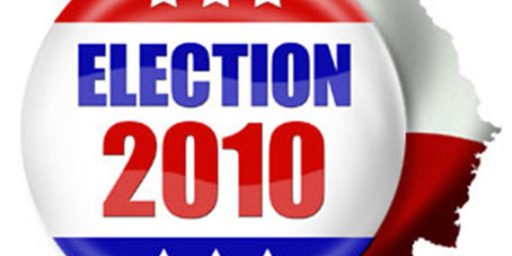Poll: Majority in US Would Prefer the Popular Vote over the Electoral College
Steven L. Taylor
·
Monday, October 24, 2011
·
19 comments
Via Gallup: Americans Would Swap Electoral College for Popular Vote

Most interesting—of course, despite such a popularity of such a position, there is no serious push for such an amendment.

About Steven L. Taylor
Steven L. Taylor is a Professor of Political Science and a College of Arts and Sciences Dean. His main areas of expertise include parties, elections, and the institutional design of democracies. His most recent book is the co-authored
A Different Democracy: American Government in a 31-Country Perspective. He earned his Ph.D. from the University of Texas and his BA from the University of California, Irvine. He has been blogging since 2003 (originally at the now defunct Poliblog).
Follow Steven on
Twitter







Why would we be attempting to make American democracy more majoritarian? Republicans have shown that real “democracy” is improved when we restrict the ballot box, and empower counter-majoritarian minorities.
Majoritarianism is not the path to freedom, therefore I am skeptical of it.
@Doug Mataconis: I am unclear how in the case of choosing a single office holder that giving more power to the minority is the path to freedom.
Indeed, it strikes me that in such a situation that the process the takes individuals most into account (indeed, by definition) is a system that awards the office to the majority.
Steven,
I’m just generally skeptical of majoritarianism, for good reason given that the will of the majority and individual liberty are very often incompatible.
The Electoral College thing? I guess it is what is. This poll is interesting, but like you said I’m pretty sure we’ll not see a Constitutional Amendment proposed, never mind sent to the states. Inertia is a powerful force.
Think of everything that’s wrong with today’s politics. Now imagine the Presidency being elected by popular vote, which would mean that winning California or Texas by 1 million votes would be more important than winning 40 other states by 24 thousand votes each. Does anyone believe the incentives produced by such a system would make things BETTER than they are now?
Mike
@MBunge: Do I think it would be fairer to treat every American as equal?
Yes, I do.
@Steven L. Taylor: “Do I think it would be fairer to treat every American as equal?”
And the road to Hell is paved with good intentions. If you can’t intelligently confront the implications of the policy you support, maybe you should rethink things.
Mike
@MBunge:
You find a preference for treating all voters the same in an electoral contest an unintelligible position?
>This poll is interesting, but like you said I’m pretty sure we’ll not see a Constitutional Amendment proposed
It’s worth reminding everyone in this discussion of the NPV Interstate Compact, which would effectively eliminate the EC without a constitutional amendment.
I highly recommend Hendrik Hertzberg’s writings on this topic.
At this point I’m ready for the switch to popular vote for President, but in the past I’ve supported the Electoral College due in support of State’s rights, but that has problems of its own.
I think the law of unintended consequences will have some people regretting changing, but maybe not that many… (and I cannot predict with any certainty what the nature of those unforeseen consequences might be at this point, but it probably will entail a significant change in the demographic of those selecting the President.)
Majority presidential elections would just cause the coming one-party-state to get to a faster start than what is doing to happen anyway.
Turnout in California, New York, New Jersey, Maryland goes up and turn out if the smallest 30 states goes down. Why bother to vote when California is going to give the Democrats such a huge edge that what the rest of the country does is unimportant.
Well, not more than 20% of the adult population even knows what the Electoral College is, ergo a poll such as this one needs to be taken with a monumental grain of salt. Hell, somewhere around 15% of all those eligible to vote can’t find the U.S. on a map of the world. Seriously.
That said, if you sat down and explained these concepts to them it would not be surprising to learn that a majority of Zombieland would prefer a national popular vote to the Electoral College. All the more reason, of course, to resist such a notion.
Hamilton was right and Jefferson was wrong. If anything the people already have far too much power. The only saving grace is that most of the true cement heads literally are too stupid to vote. Otherwise we’d already have devolved into a banana republic. With the ways in which the education systems have disintegrated over the past few decades it would be suicidal to give Zombieland even more power.
Fortunately a national popular vote system never will come to pass.
@MBunge: That’s exactly it. Now, it doesn’t matter if you win California by 10,000 or a million votes, and really, we pretty much know that California will go democrat, Texas will go republican, and places in between. Therefore, it really means that the majority of most campaigns are fought in a few states – hello, Ohio, land of no economy, and Florida, land of no youth – while any appearances the candidates make elsewhere are solely to prop up anyone else running in that area, I.E.: I expect to see a lot of Mitt Romney in Connecticut to prop up Linda McMahon.
@superdestroyer:
Actually I’m not sure that’s the way it would turn out. Right now the Republican’s presumably don’t campaign that much in these states because it doesn’t matter if you get 30% or 49% of the vote, the winner takes all. With a popular vote getting even a large minority in these states matters, so campaigning there matters. As I stated in my first comment, I think the consequences of a popular vote for President are unknown and unpredictable.
@Steven L. Taylor: “You find a preference for treating all voters the same in an electoral contest an unintelligible position?”
You know, this must be what it was like to argue with a supporter of Prohibition. You’re getting all goo-goo about “fairness”. I’m talking about practical realities. How many times has supporting a policy while being completely indifferent to the actual results of that policy EVER turned out to be a good idea?
Mike
@MBunge: All I can say at this point is this: I find it interesting that you are the one accusing me of being unintelligible/not defending my position, but you refuse to answer simple, direct questions.
@MBunge: I am not honestly sure what the practical problems you are objecting to here, save the notion that, in fact, we would count all the votes.
We elect governs like this, and in that process the parts of a given state with bigger populations have more sway than lower population regions by dint of having, well, more voters.
Further, many countries use this system to elect their presidents (i.e., all other presidential systems except the US), so there is plenty of evidence to suggest that it can work just fine.
You seem to be saying that a system that privileges Ohio and Florida and some shifting number of rotating swing states is better than just adding up all the votes (preferably with a run-off provision).
You have not actually articulated why this is so horrible save than you seem to fear California. Articulate your position if you are going to constantly tell me that I am not explaining mine (which I have done repeatedly in multiple posts, in fact).
@Steven L. Taylor: “Articulate your position if you are going to constantly tell me that I am not explaining mine (which I have done repeatedly in multiple posts, in fact).”
Some goo-goo words about fairness is not articulating your position. How would a popular vote system change the ways Presidential campaigns are run? What are the probably consequences of those changes?
Mike
@MBunge: Two quick thoughts:
1) You still have failed to answer two direct questions.
2) Dismissing something as “goo goo words” hardly constitutes an argument.
And, if you like, for your reading pleasure:
Against the Electoral College I: Disparity Amongst Citizens
Against the Electoral College II: Not As Framers Intended
Against the Electoral College III: Policy Implications
There’s more, but I will leave it at that.
Also, your argument seems to be that it would be a bad thing for all the people in California to count. Not much of an argument, to be honest.